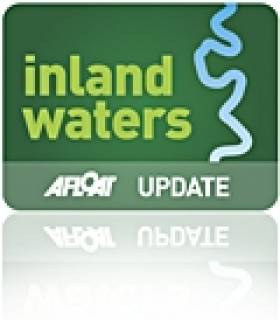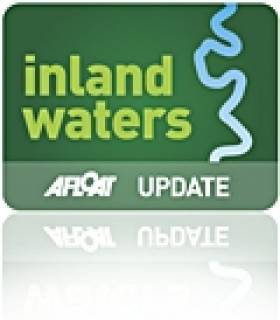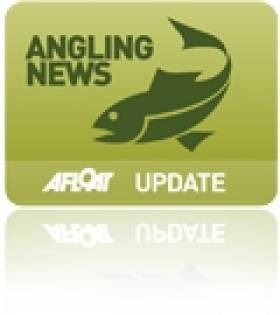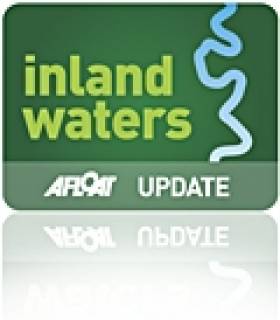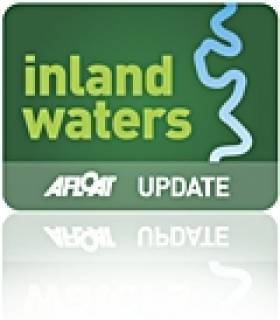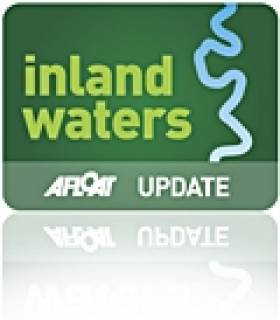Displaying items by tag: Lough Ree
Kennedy Seeking SB3 Hat-trick on Lough Ree
Up to 25 boats are expected for the Irish SB3's end of season bash this weekend at the Midland Championships at Lough Ree Yacht Club. This event was first run in 2007 as part of the first SB3 national circuit. The idea was to run a midland event that would rotate between Lough Ree and Lough Derg Yacht Clubs. The event rotates every two years and has been a huge success each year.
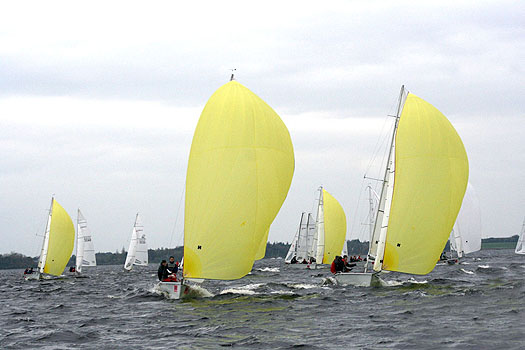
Downwind action in good breeze at the SB3 Midlands on Lough Ree. Photo: Oona Herraghty
Peter Kennedy on Ridgefence will return to defend his title and try to make it a hat trick having won the 2009 and 2010 event on Lough Derg.
The competition is expected to be stiff with Ben Duncan and Brian Moran (Sharkbait) on fire after their National Championships win. Ben also came fourth in last weekend's All Ireland Sailing Championships in Dromineer. A number of the top 10 boats from the Nationals will also be in attendance with Andrew Algeo and Rob Howe both competing.
The event, supported by Galway Maritime, is used to unpredictable weather conditions and over the last few years the fleet has experienced everything from flat calm and blue skies to wet and windy.
Waterways Returns to the Screen This Sunday
Waterways returns to RTÉ television after 16 years off the air this coming Sunday.
The original award-winning 1990s documentary series saw naturalist and poet Dick Warner undertake an epic journey traversing the canals of Ireland by barge.
This year filmmaker Stephen Rooke accompanied Warner as he returned to our inland waterways, this time to explore the newly restored Royal Canal and celebrate the reopening of the entire route from Dublin to the Shannon.
As previously reported on Afloat.ie, Warner travels on the Rambler, an original canal tug barge, from Dublin to Lough Ree - the first time it had followed the route since 1923.
Along the way, Warner meets both experts and ordinary people who live along the banks, learning from them about its heritage, history and wildlife.
Filming is now complete on the new six-part series, Waterways - A Royal Canal, which begins this Sunday night.
According to Irish Film and Television News, Rooke re-assembled the core team from the original series, many of whom have gone on to work on successful films and TV shows.
The series begins on RTÉ One at 8.30pm on Sunday 2 October.
Sailors Plan Month Long Journey from Shannon to Liffey and Back
Nenagh resident and inland waterways enthusiast, Nick Theato, single-handed aboard 'Bo-Bo, a five metre Pedro trailer/sailer and Pat Kelly, Killadangan, with his son Andrew in 'Shu-Ra-Nu', a 6 metre Etap 20 trailer/sailer, plan to raise funds for Lifeboats Ireland by undertaking the IWAI Green & Silver Challenge in June, 2011. Their fundraising target is €5,000.00.
On the 25th June, 1946, Tom and Angela Rolt left Athlone aboard 'Le Coq', a 28ft.x8ft. converted ship's lifeboat on a voyage that would inspire contemporary and successive generations of inland waterways enthusiasts.
Tom Rolt wonderfully documented the voyage in his book 'Green & Silver', published in 1949, which has since become a classic. This work was instrumental in inspiring the small group who founded the Inland Waterways Association of Ireland in 1954, whose objective was to save the Shannon navigation from strangulation by low bridges. Indeed, the colour scheme of the IWAI's logo and burgee derive from the cover design of Rolt's book.
With the re-opening of the Royal Canal in October 2010, it is now possible to retrace Rolt's journey in full and complete the circular route formed by the Royal Canal, River Liffey, Grand Canal, River Shannon and Camlin River.
To celebrate this event, the IWAI has initiated the 'Green & Silver Challenge' in an effort to encourage people to make the circular journey. Nenagh resident, Nick Theato single-handed aboard 'Bo-Bo, a 16 foot Pedro trailer/sailer and Pat Kelly, Killadangan, with his son Andrew aboard 'Shu-Ra-Nu', a 20 foot Etap trailer/sailer, plan to raise funds for Lifeboats Ireland by travelling the full Green & Silver Route throughout June 2011.
Departing on June 1st, they will travel from Dromineer through Lough Derg and Lough Ree and enter the Royal Canal at Richmond Harbour. They plan to cross the Liffey in Dublin 17 days later, where they will take a welcome day off before commencing the return journey via the Grand Canal to Shannon Harbour. The journey will take approximately 28 days, will cover a minimum of 333 km. and navigate through 92 locks (some double), 91 of which are manual. Their fundraising target is €5,000
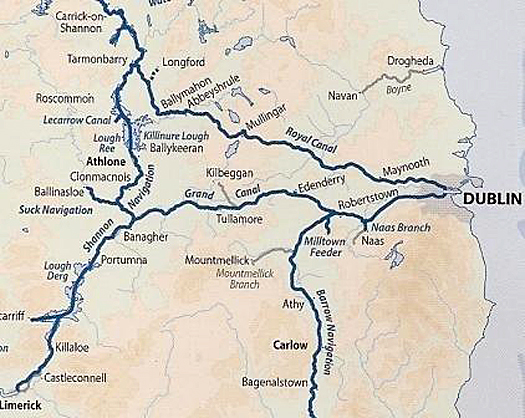
Nick Theato is Treasurer of the Lough Derg RNLI Fundraising Branch and Lough Derg Lifeboat Station at Dromineer.
Pat Kelly is Secretary of the Lough Derg RNLI Fundraising Branch.
Nick and Pat welcome all sponsorship, however modest. Contributions can be pledged online at http://www.mycharity.ie/event/green_silver_event/. Nick may be contacted on 086 1738014 ([email protected]). Pat is at 087 6908099 ([email protected]).
For further details / interviews / photos: Contact Pat Kelly at 087 6908099 ([email protected]). Support photography: Gerardine Wisdom 087 6522582 ([email protected]).
Lough Ree Pike Fest to Include Pike World Cup
This year's Lough Ree International Pike Angling Festival will also play host to the Pike World Cup in Athlone, Co Westmeath, from 13-15 April.
The current festival format remains unchanged, but The Irish Times reports that the Pike World Cup will go to the boat with the longest total length of pike over three days of fishing, counting one fish each day.
The tournament - with total prize money of €28,000 up for grabs - is open to all anglers, though there is a maximum entry limit of 100 boats, or 200 anglers.
For more details visit pikefishinginireland.com or contact Dave Houghton at 071 964 2743.
Athlone's Lakeside Marina to Open 50 New State of the Art Berths in 2011
Lakeside marina are getting on with improvements, recession or not. It's out with the old and in with the new in Athlone as Lakeside on the inland waterways extends and removes all older jetties and replaces them with state of the art jetties, electrics and lighting.
The Athlone and Lough Ree area has always been a preferred choice for moorings, even more so recently as its proximity to Dublin, connected by motorway is only an hour away.
When the project is finished in May 2011, Lakeside marina will have modern facilities for 150 boats, indoor winter facilities for 50 boats, lift-out for up to 50 tons, its own transport company, on-site chandlery, on-site Clubhouse and full mechanical and technical back-up.
Lough Ree Yacht Club Annual Regatta Underway
Inland Waterways Vessels on Lough Ree at Athlone may meet large fleets of sailing craft at the southern end of Lough Ree approximately 3km north of Athlone due to Lough Ree Yacht Club Annual Regatta currently taking place.
Masters are requested to give racing fleets a wide berth where possible, however, if it is necessary to pass through a fleet to do so with due caution. The regatta will finish this Friday, 6th Aug 2010.
Marine VHF Channel 16 will be monitored by the principal race officer throughout the regatta.
Dog Poisoned as Toxic Algae Bloom Returns to Lough Ree
Westmeath County Council is warning people about the dangers of the algae for animals which forms during spells of dry weather with little or no wind.
Cllr Kevin 'Boxer' Moran told the Westmeath Independent that the dog's owner approached both himself and the council to alert them to the danger and said it was a tragic thing to happen any pet lover. The man had also been swimming, but was not affected by the algae.
Lough Ree Yacht Club
History
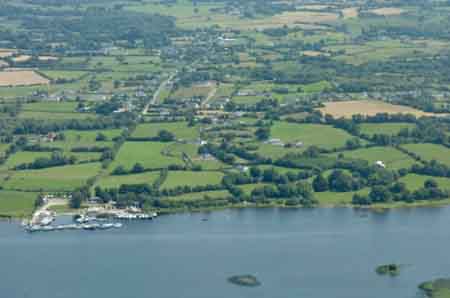 Founded in 1770, Lough Ree Yacht Club is the second oldest sailing club in the world. The tradition of organised pleasure boating in Athlone goes back to at least 1731, with a regatta on the Shannon amongst the 'diversions' promised for a festival week in the town. Early activities appear to have involved a rendezvous at some agreed place and a cruise in company in the manner of a naval flotilla but racing eventually developed.
Founded in 1770, Lough Ree Yacht Club is the second oldest sailing club in the world. The tradition of organised pleasure boating in Athlone goes back to at least 1731, with a regatta on the Shannon amongst the 'diversions' promised for a festival week in the town. Early activities appear to have involved a rendezvous at some agreed place and a cruise in company in the manner of a naval flotilla but racing eventually developed.
From its earliest days it was known as Athlone Yacht Club and was renamed Lough Ree Yacht Club in 1895. At that time the lion and roses from the arms of Athlone town were also adopted as the Club burgee.
Junior sailing was introduced to the Club in 1968 in the form of a dozen Optimist dinghies, and this fleet has expanded and thrived most successfully since that time being joined by Mirrors and Lasers in recent years.
Cruiser racing has returned to prominence over the past thirty years with a mixed handicap fleet and the J24 one design was adopted as a Club class in 2000.
The Club has made rapid strides in recent years, particularly by the acquisition of more property, and the extension and improvement of the premises and provision of fixed and floating jetties. Sailing activity is currently at a high level and the Club continues in the tradition of its 237 years to be a convivial centre of sailing on Lough Ree and the host to many important sailing events.
(The above information and image courtesy of Lough Ree Yacht Club)
Lough Ree Yacht Club, Ballyglass, Coosan, Athlone. Tel: 0906 475976, Email: [email protected]
Have we got your club details? Click here to get involved




























